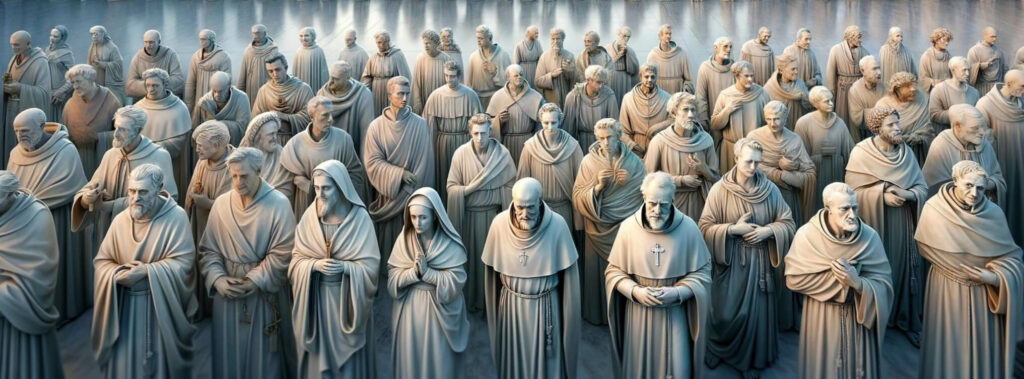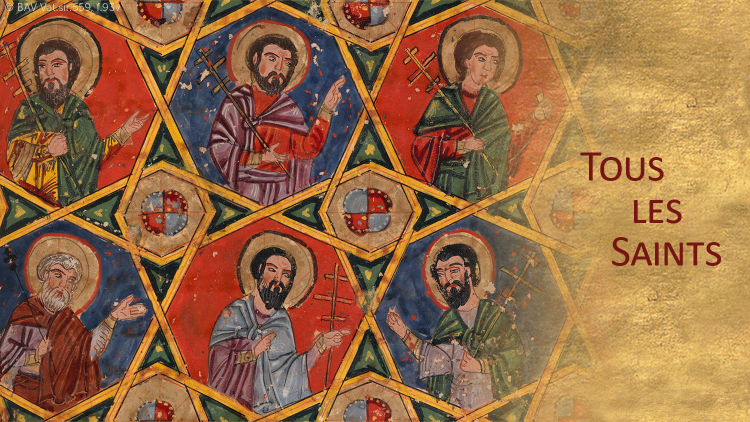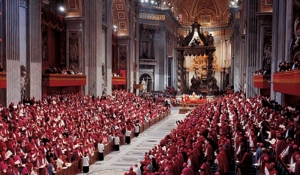- The spiritual meaning of indulgence
Indulgence is a concrete manifestation of God’s mercy, which transcends and transforms the limits of human justice.
An indulgence reveals God’s way of acting: He reorders all history, all our history, according to His love. In French, the word ” indulgence ” carries a connotation of weakness that is foreign to the reality of what God is doing. He reminds us of the closeness of the Kingdom by living, right now, in the most important of realities: charity. To benefit from an indulgence is to experience with gratitude the happy disproportion between our littleness and the greatness of God, who can restore humanity to his grace (Cf. Eucharistic Prayer for Reconciliation I).
The plenary indulgence is a grace offered by God on the occasion of the Jubilee Year.
It is reparation, erasing the disorder caused by sin.
Indulgence is God’s indulgence. It cannot be earned, but is a pure gift of Divine Mercy.
- In the sacrament of forgiveness, sin is forgiven.
- But there remains the disorder caused by sin, a disorder that requires reparation, the so-called “penalty”, which gives rise to the “penance” that the forgiven sinner performs after receiving sacramental forgiveness.
The plenary indulgence is a grace offered by God on the occasion of the Jubilee Year. It is reparation, the erasure of the disorder caused by sin. It is requested through exercises of piety, confession, passage through the Holy Door, prayer for the Holy Father’s intentions… It is received in the communion of saints who never cease to pray for the acceptance of Divine Mercy, on earth as it is in heaven.
God is always ready to forgive, and never tires of offering it in new and unexpected ways.
Extract from the Bulle: “God is always ready to forgive, and never tires of offering it in ever new and unexpected ways… In the sacrament of reconciliation, God forgives sins, and they are truly erased, though the negative imprint of sins in our behavior and thoughts remains. But God’s mercy is stronger than this. It becomes the indulgence of the Father, who reaches out to the forgiven sinner through the Bride of Christ (the Church), and frees him from all that remains of the consequences of sin, enabling him to act with charity, to grow in love rather than fall back into sin.” MV n°22, Pope Francis.

***********************************************************
- The Church and the Plenary Indulgence?
The Vatican has therefore announced that plenary indulgences will be granted as part of the Jubilee Year 2025, as is often the case during a Holy Year. On May 9, the feast of the Ascension, Pope Francis read the Bull of Indiction for the Jubilee.
By granting a plenary indulgence, the Catholic Church expresses its desire for the faithful to experience God’s mercy. Indeed, to grant a plenary indulgence is to declare the remission or forgiveness of sins and of “all that remains of the consequences of sin”. “of all that remains of the consequences of sin”, reads the note from the Apostolic Penitentiary published this Monday, May 13.
In the Christian religion, sin is “a lack of love towards God, towards one’s neighbor and towards oneself”. (source: Catholic Church in France). For Catholics, the Church is the key to their relationship with God. If it is God who forgives, for the faithful the remission of sins requires a sacrament, the sacrament of penance. This allows reconciliation with God.
***********************************************************
- Does plenary indulgence replace confession?
It is the role of the Apostolic Penitentiary, the supreme tribunal of the Catholic Church, a body of the Roman Curia, to determine the conditions for obtaining a plenary indulgence. In its May 13 note, it recalls that the plenary indulgence is granted to the “truly repentant faithful who have been “during the Holy Year, purified by the sacrament of penance”. The indulgence is therefore the remission of sins already forgiven in the sacrament of reconciliation.
***********************************************************
- Can I receive a plenary indulgence more than once?
The Vatican indicates that the plenary indulgence can, under certain conditions, be received “daily”: “By complying with the spiritual, sacramental, and prayer conditions, the faithful will certainly be able, to reproduce such visits during the Holy Year and thus receiving each time, and even daily, the Plenary Indulgence.”
Plenary indulgences are sometimes difficult to understand. Inherited from the long and sometimes tumultuous history of Catholicism (in the 16th century, there was the “Indulgences quarrel”), it could give the impression of something magical. As if God’s forgiveness were granted automatically, according to a set of instructions.
The Church’s proposal can be seen as a pedagogy. Granting a plenary indulgence is an invitation to enter into a spiritual process, guided by the desire to draw closer to God. All the gestures and rites proposed by the Catholic Church to obtain a plenary indulgence, such as helping the most vulnerable, encourage an openness to others and a particular disposition to experience God’s love.
***********************************************************
- How can I obtain a plenary indulgence?
In addition to confession, the faithful wishing to obtain a plenary indulgence will have to take a number of other steps: practicing the sacraments, going to Mass, taking Communion, going on pilgrimage, performing what the Catholic Church calls “works of mercy”, and training.
***********************************************************

- Jubilee pilgrimage sites
In his bull of induction, Pope Francis insists on the notion of pilgrimage. The theme of the Jubilee 2025 is “Pilgrims of Hope”. According to the Apostolic Penitentiary, “the plenary indulgence is granted if the faithful make a pilgrimage to any place linked to the Jubilee”.
The pilgrimage sites are the four papal basilicas in Rome (St. Peter’s in the Vatican, St. John Lateran, St. Mary Major and St. Paul’s Outside the Walls). Nearly 40 million pilgrims are expected in 2025.
Other places associated with the Jubilee include the three basilicas in the Holy Land: the Basilica of the Holy Sepulchre in Jerusalem, the Basilica of the Nativity in Bethlehem and the Basilica of the Annunciation in Nazareth. Outside Rome and the Holy Land, Marian shrines and cathedrals are also places of pilgrimage associated with the Jubilee. As well as a number of places determined by the Bishops’ Conferences of each country.
***********************************************************
- What is a work of mercy?
The Catholic Church uses the term “works of mercy” to refer to the care and assistance given to others. “The faithful will be able to benefit from the Jubilee Indulgence by visiting, for a sufficient period of time, people in difficulty (the infirm, prisoners, isolated old people, the handicapped…), thus accomplishing a pilgrimage to Christ present in them.”
***********************************************************
- Training: frequenting Catholic Church texts
The year 2025 will also mark the 60th anniversary of the end of the Second Vatican Council, which ended on December 8, 1965. In its note, the Apostolic Penitentiary encourages the faithful wishing to obtain a plenary indulgence to study the texts of the Council in particular.

